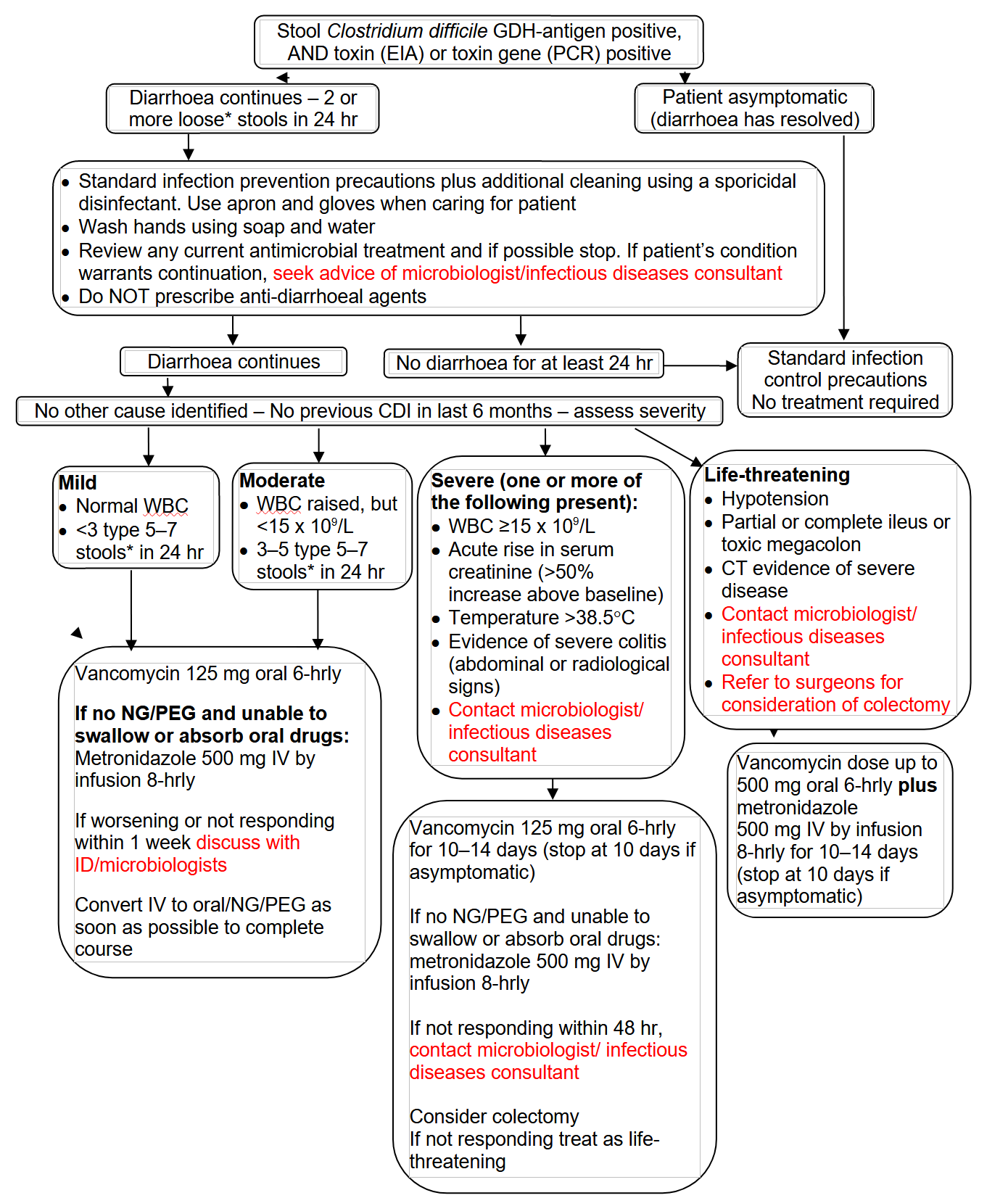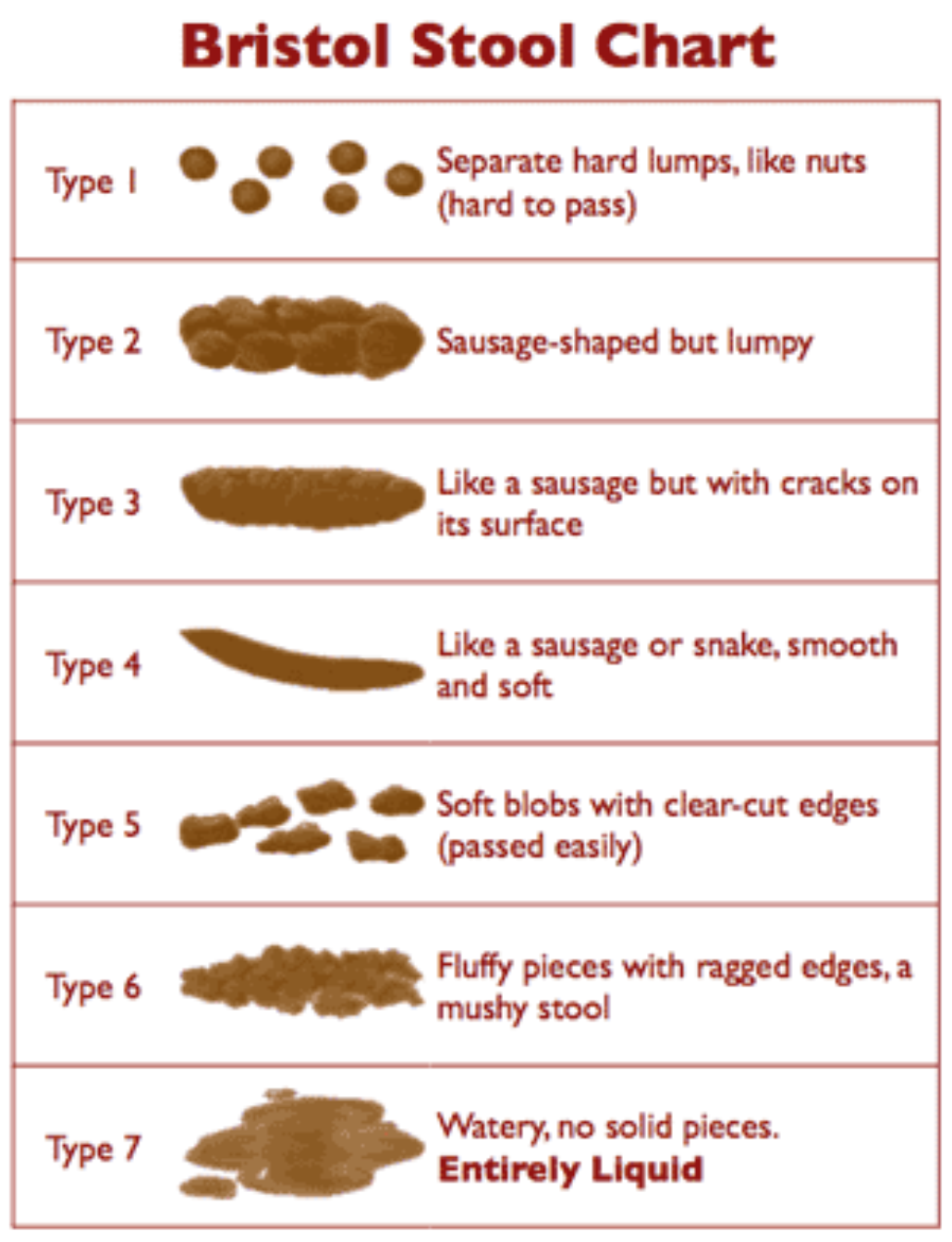DO NOT USE - ALL INFORMATION LIKELY INCORRECT IF NOT ACTIVELY DANGEROUS
Please use current guidelines available on the UHNM intranet for patient treatment
Please use current guidelines available on the UHNM intranet for patient treatment
RECOGNITION AND ASSESSMENT
Symptoms and signs
- >1 watery, loose or unformed stools within 24 hr
- ± signs of colitis
Risk factors
- Gastric acid suppression
- Advanced age
- Previous hospitalisation
- Duration of hospitalisation
- Care home residency
- Abdominal surgery
- Nasogastric tube
INITIAL MANAGEMENT
Laxative or antibiotic treatment
- If the diarrhoea may be caused by laxative or antibiotic
- stop laxative and, if possible, stop antibiotics
- for 24 hr follow impact on diarrhoea
- If the diarrhoea stops, do not submit a stool sample
- If the diarrhoea continues, send diarrhoeal stool sample
New unexplained diarrhoea
- Isolate patient with in a side room (any ward) within 2 hr
- Send diarrhoeal stool sample
- If necessary, promptly escalate to site manager
Investigations
- FBC for WBC↑
- U&E
Stool sample for microbiology
- A diarrhoeal sample is a stool taking the shape of the container
- The laboratory will not test formed stool
- Interpretation is provided with all test reports
Colitis
- Signs of colitis: X-rays/CT scan abdomen
- Lower gastrointestinal endoscopy for tissue biopsy
- invasive
- in severe colitis may increase the risk of perforation
- in case of doubt about diagnosis, contact gastroenterologist
CONFIRMED CDI MANAGEMENT
- Confirmed=Stool C. difficile GDHA positive with TEIA or PCRG positive
Management
- Nurse in single room (any ward)/C. difficile cohort ward
- Contact infection prevention team (IPT)
- Avoid successive uninterrupted courses of different antimicrobials for any indication


SUBSEQUENT MANAGEMENT
- Nurse patient in side room/cohort ward until symptom-free for 72 hr
- If another cause identified, discuss with microbiologist/ID consultant
- If mild/moderate CDI deteriorates, or if diarrhoea fails to respond to antimicrobial treatment of CDI for>5 days, discuss with microbiologist/ ID consultant
Repeat stool samples
- Unless diagnosis in doubt, do not send repeat stool within 72 hr
- If GDHA and TEIA positive, do not send further stool for CDI testing within 28 days
- stool can remain toxin positive for several weeks
RECURRENCE/NON-RESPONDER
- Keep in side-room irrespective of symptoms until the first of:
- hospital discharge or
- 6 months have elapsed since last CDI diagnosis
- Review any current antimicrobial treatment and if possible, stop
- If life-threatening colitis, refer to GI surgeons for consideration of colectomy
- Contact microbiologists for advice which may include:
- first recurrence within 6 months, or if no response to oral vancomycin within 2-5 days, treat with fidaxomicin 200 mg 12-hrly for 10 days
- subsequent recurrence within 6 months (3rd or further episode of CDI), consider FMT or commence fidaxomicin 200 mg 12-hrly, to be given for 10 days
Faecal microbiota transplant (FMT) infusion
- Infusion of a filtrate of gut flora derived from healthy donor faeces
- Patients with recurrent CDI treated with FMT demonstrated:
- 91% primary cure rate with symptoms usually resolving within 48 hr
- reduced risk of recurrent CDI in the following months provided that the patient does not receive further antibiotics
- Consider FMT for a 3rd or further episode of CDI
Administration
- Obtain patient’s consent
- Contact microbiologist
- Complete FMT order form for microbiologist to order from the local PHE Laboratory
- Preparation of stool from pre-screened universal donors will arrive in 3-4 days
- Stop all antibiotic treatment (including for CDI) on the day before FMT is to be administered
- Prepare patient for administration
- via nasogastric, naso-jejunal tube or PEG
- if above routes are not an option, via colonic infusion by a gastroenterologist
Last reviewed: 2023-10-18